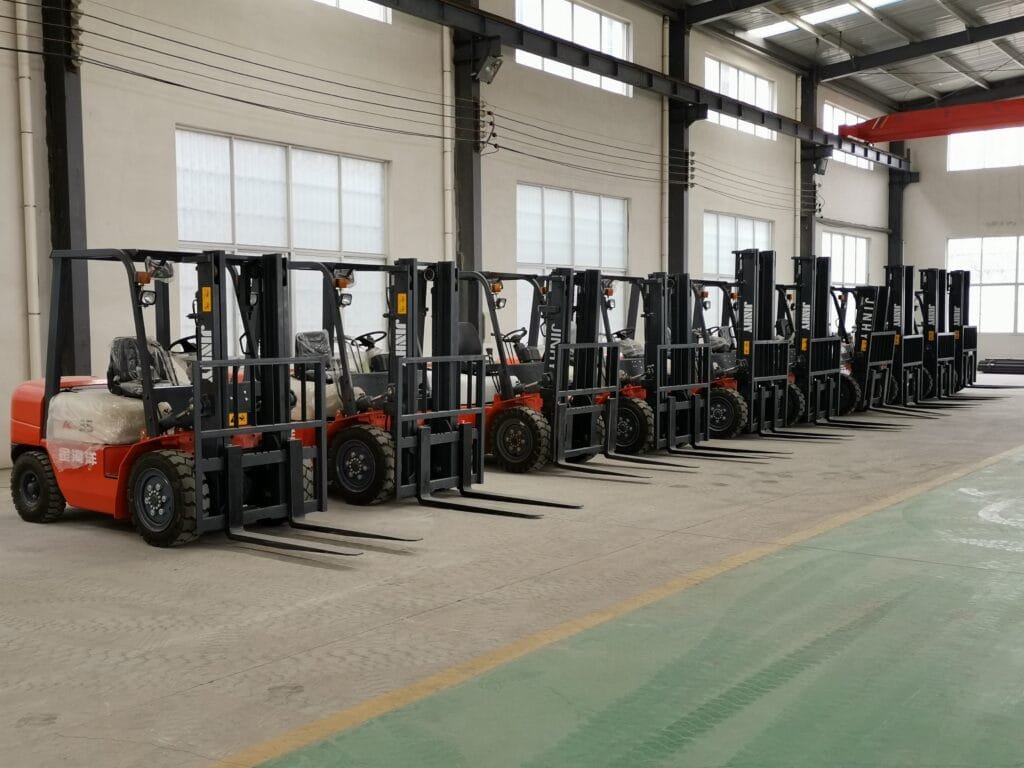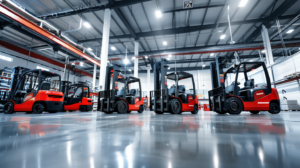Introduction
Forklifts are crucial for many industries, whether it’s for warehouses, factories, or construction sites. They help streamline processes by handling heavy loads efficiently and increasing productivity. China, being the global manufacturing powerhouse, is one of the top exporters of forklifts worldwide. The affordability and wide variety of forklift models offered by Chinese manufacturers make them a popular choice for businesses looking to save on equipment costs.
However, just because Chinese forklifts are often cheaper than those from other countries doesn’t mean that you should settle for the first deal that comes your way. In fact, the process of buying a forklift involves multiple considerations, such as model selection, dealer reputation, quality control, and shipping costs. To help you make an informed decision and save money, we’ve compiled essential tips on how to approach forklift purchases from China.

1. Understand the Types of Forklifts Available
Before you even start shopping, it’s important to know which type of forklift best fits your needs. There are several types of forklifts, and each serves different purposes. Understanding these will help you avoid overspending on features you don’t need.
a. Electric Forklifts
These forklifts are known for their environmental benefits and low operating costs. They’re suitable for indoor use since they don’t emit harmful fumes. While electric forklifts may have a higher upfront cost, they are often more affordable in the long run due to lower maintenance and fuel costs.
b. Diesel Forklifts
Diesel forklifts are best suited for outdoor applications where power and performance are needed. They are highly durable and efficient for lifting heavier loads but come with higher fuel costs and more maintenance requirements.
c. LPG Forklifts
These forklifts use liquefied petroleum gas (LPG) as fuel, which is more environmentally friendly than diesel. They are more economical than electric forklifts in terms of upfront costs but require regular maintenance of the gas tanks and engines.
d. Rough Terrain Forklifts
Designed for outdoor use on uneven terrain, these forklifts are perfect for construction sites or warehouses with rough floors. Though generally more expensive, they are built to handle difficult conditions and heavy-duty lifting.

2. Identify Your Load Capacity Requirements
One of the biggest factors affecting forklift pricing is the load capacity. Forklifts can carry anywhere from 1 ton to more than 10 tons, depending on the model. Overestimating or underestimating the load capacity can lead to unnecessary costs.
How to Determine Load Capacity:
- Evaluate Your Regular Loads: Look at the weight of the heaviest items you’ll need to move regularly. This will help you decide whether you need a standard forklift or a heavy-duty model.
- Consider Future Growth: If you plan to expand your business or store heavier items in the future, consider investing in a higher-capacity forklift. This will help you avoid having to purchase a new one down the line.
3. Focus on the Manufacturer’s Reputation
Choosing a reliable manufacturer is crucial for ensuring that you get good value for your money. While China is home to many forklift manufacturers, not all of them adhere to high-quality standards. Opting for well-established manufacturers can ensure that you receive a forklift that is durable, easy to maintain, and has good customer support.
Tips for Choosing the Right Manufacturer:
- Research Online Reviews: Look at reviews and testimonials from other customers to assess the manufacturer’s reputation. Websites, forums, and social media groups dedicated to forklifts can provide insights into the manufacturer’s product quality.
- Check Certifications: Ensure the manufacturer complies with international quality standards, such as ISO 9001 or CE certification. These certifications indicate a commitment to maintaining high manufacturing standards.
- Compare Multiple Manufacturers: Don’t settle for the first forklift brand you find. It’s essential to compare prices, warranties, and product features from multiple manufacturers to find the best deal.
4. Consider Forklift Age and Condition
Buying a brand-new forklift is not always necessary, especially if you’re on a tight budget. In many cases, used forklifts can provide the same functionality as new ones but at a much lower price.
Tips for Buying Used Forklifts:
- Inspect the Condition: Ensure that the forklift has been well-maintained and that all essential parts (engine, wheels, hydraulic system, etc.) are in good working condition.
- Request Maintenance Records: Always ask for the maintenance and service history of a used forklift. This can give you a clearer idea of its performance and whether it requires any upcoming repairs.
- Check Warranty Options: Some manufacturers and dealers offer warranties on used forklifts, which can add value and protect your investment.

5. Compare Prices Between Different Dealers
The price of forklifts can vary significantly between different dealers, even for the same model. Prices will depend on factors such as shipping, taxes, and dealer markup. In China, the difference in price can be influenced by whether you’re buying directly from the manufacturer or through a distributor.
Tips for Comparing Prices:
- Request Multiple Quotes: Always get quotes from at least three different dealers. This allows you to compare pricing and negotiate a better deal.
- Consider Shipping Costs: Shipping fees from China to your location can add a significant amount to the overall cost. Some dealers may offer better shipping deals or can help you arrange cheaper logistics options.
- Negotiate the Price: Don’t be afraid to negotiate. If you’ve done your research and found lower prices elsewhere, mention it to the dealer. Often, they will be willing to adjust their prices to remain competitive.
6. Factor in Shipping Costs
When buying a forklift from China, shipping is one of the most critical factors that can affect the total cost. Forklifts are large and heavy equipment, which means shipping costs can be expensive.
Tips for Minimizing Shipping Costs:
- Choose the Right Shipping Method: Depending on your location, you may be able to save money by choosing a slower shipping option, such as sea freight, instead of air freight.
- Consolidate Shipments: If you’re ordering multiple forklifts or other equipment, consider consolidating your shipments to reduce the shipping cost per unit.
- Work with the Dealer: Some dealers may offer discounted or even free shipping for bulk orders. Make sure to inquire about these options before finalizing your purchase.
7. Consider After-Sales Support and Warranty
Purchasing a forklift from China comes with the potential risk of service difficulties, especially if the forklift needs repairs and you’re far from the manufacturer. Ensure the dealer offers reliable after-sales support and that you’re aware of the warranty terms.
What to Look for in After-Sales Support:
- Warranty Length: A good warranty can save you a significant amount of money in case of a breakdown. Look for warranties that cover the key components of the forklift, such as the engine and hydraulic system.
- Parts Availability: Ensure that spare parts are readily available in your location. Some Chinese manufacturers have local distributors or service centers in various countries that can help you with parts and servicing.

8. Leverage Bulk Purchasing
If your business needs multiple forklifts, consider negotiating a bulk purchase deal. Purchasing several forklifts at once can often secure a discount, significantly reducing the cost per unit.
How to Maximize Bulk Discounts:
- Negotiate Bulk Prices: Dealers are often willing to give significant discounts for large orders. Ask about discounts or special deals for bulk purchases.
- Negotiate for Free Add-ons: Besides getting a price reduction, some dealers may offer free services, like extended warranties or maintenance packages, when purchasing in bulk.
9. Don’t Overlook the Cost of Spare Parts and Maintenance
While the initial purchase price of a forklift is important, ongoing maintenance costs should not be neglected. Some Chinese forklifts may have lower upfront costs but higher maintenance or parts replacement costs.
Tips for Managing Maintenance Costs:
- Research Spare Parts Availability: Before purchasing a forklift, check if spare parts are easy to find and reasonably priced. Forklifts with unique parts or specific designs can sometimes have higher maintenance costs.
- Invest in Regular Maintenance: To ensure the longevity of your forklift, schedule regular maintenance to prevent major repairs that could be more expensive in the long run.
10. Take Advantage of Financing Options
Many Chinese forklift manufacturers and dealers offer financing options that can make purchasing a forklift more affordable. Financing allows you to spread the cost of the forklift over time, making it easier on your budget.
Tips for Financing Forklifts:
- Shop Around for Financing Plans: If you need to finance your forklift, compare different financing plans and interest rates from various dealers and banks to find the best deal.
- Check for Zero-Interest Offers: Some dealers may offer zero-interest financing for a set period. This can significantly reduce your total costs if you pay off the forklift within that time frame.

11. Beware of Hidden Costs
When purchasing a forklift, it’s important to account for all potential costs, not just the initial price. Hidden costs, such as taxes, import duties, and extra fees, can add up quickly and push your budget beyond expectations.
What to Watch Out For:
- Import Duties and Taxes: Depending on your location, import duties and taxes can make up a significant portion of the total price. Research the regulations in your country before making a purchase.
- Extra Fees: Some dealers may charge additional fees for documentation, insurance, or certification. Ensure you have a clear understanding of all the fees involved in the purchase.
Conclusion
Buying a forklift from China can be an excellent way to save money, but it requires careful planning and research to avoid unexpected costs. By understanding the types of forklifts available, selecting a reliable manufacturer, comparing prices, and factoring in shipping and maintenance costs, you can make a purchase that provides excellent value for your business.
Remember to always consider the long-term costs of ownership, such as maintenance, parts availability, and after-sales support. With the right approach, you can secure a forklift that will enhance your productivity without breaking the bank.
Frequently Asked Questions (FAQs)
- How much does a forklift from China cost?
- The price of a forklift can range from $3,000 to $15,000, depending on the type, capacity, and features. Heavy-duty models may cost more.
- Are Chinese forklifts reliable?
- Chinese forklifts can be reliable, but it’s essential to choose a reputable manufacturer and ensure that the forklift meets international quality standards.
- Is it better to buy a new or used forklift from China?
- If you have a tight budget, a used forklift might be a more cost-effective option. However, a new forklift typically offers longer-lasting performance and warranties.
- How can I save on shipping costs when buying from China?
- Consider choosing slower shipping methods, consolidating shipments, or working with dealers who offer discounted or free shipping.
- Are there financing options for buying Chinese forklifts?
- Yes, many dealers offer financing options, allowing you to spread the cost of the forklift over time.
- What’s the best way to find a reputable forklift dealer in China?
- Research online reviews, check certifications, and compare quotes from multiple dealers before making your purchase.





